[HOME]
[Town Trail]
[Extravaganza]
[Tramway]
[Excursions]
[Links]
[Great Orme] [Saint Tudno]
[Country Park]
[Summit Complex]
[Tramway] [Aerial Cable Cars]THE GREAT ORME - THE MARINE DRIVE
The Marine Drive is a four
mile scenic drive round the base of the Great Orme headland, from
Llandudno's North Shore to Llandudno's West
Shore and it has much to interest the traveller. It is a toll
road, but the charge is only £2.50
per
car and
that includes parking on the Orme, including at the summit. Drive
slowly,
its one way only for the first 3½ miles so you shouldn't meet
anything, and enjoy spectacular views at every turn - there are many
places
to park - stop often and look up and down. Better, take the
vintage coach ride from the Prince Edward Gardens on the promenade.
Even better, it's a
grand walk at any time of year.
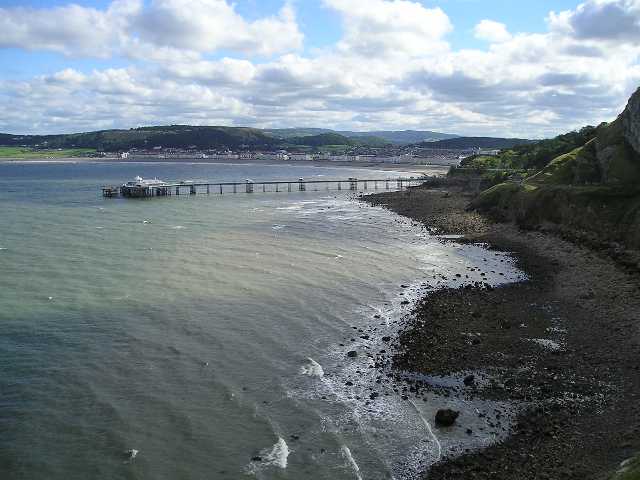
Wonderful views at all seasons and in all directions.
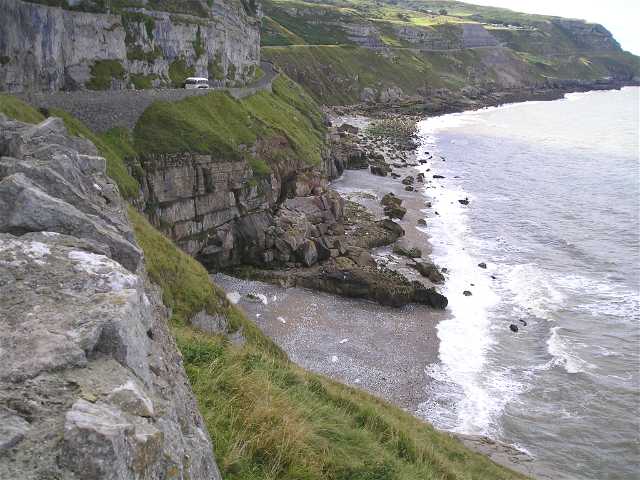
Alpine Travel's Marine Drive Tour uses vintage coaches.

On rocky ledges below the drive fishermen cast their lines and try their luck.
Wonderful views at all seasons and in all directions.
Alpine Travel's Marine Drive Tour uses vintage coaches.
On rocky ledges below the drive fishermen cast their lines and try their luck.
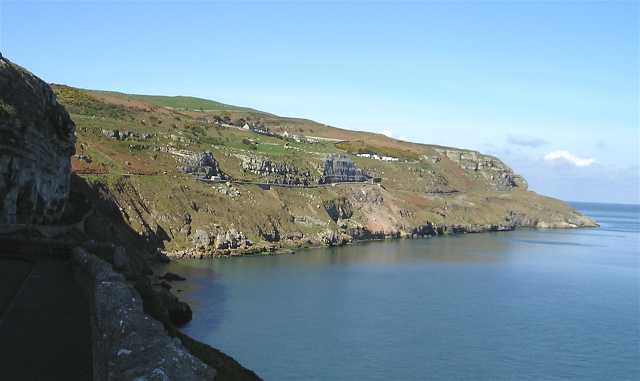
Saint Tudno's Church and churchyard are high on the hillside above the drive.
Take the side road detour to Saint Tudno's Church and on to the summit of the Great Orme.
Saint Tudno built the first church here in the sixth century.
Services are held every Sunday from the end of May to the end of September.
Click Saint Tudno for a better understanding of his mission.
Continue beyond St. Tudno to the Summit of the Great Orme or
return to the marine drive and continue the circuit of the Great Orme.
Click Great Orme Summit Complex for photographs of the summit.
Returning to the Marine Drive the circuit continues to the lighthouse
and to the Rest & Be Thankful Café.
High above the sea is the lighthouse built in 1862 by The Mersey Docks & Harbour Company.
The light, at 325 feet above high water, was the highest on the coast of Wales.
It first shon on December 1st 1862 and every night until decommissioned on March 22nd 1985.
Even the smallest boats now have radar systems and lighthouses are no longer needed.
The Lighthouse now serves as an interesting and well appointed B & B guest house.
The Lighthouse is reached via the Marine Drive, which is one way only from the pier.
Passing below the lighthouse cliffs.
The Alpine Travel Marine Drive Excursion calls at the halfway house
- just time to buy an ice-cream or a chocolate and enjoy the view.
The "Rest
& Be Thankful"
café, just above the lighthouse, is exactly half way round.
It is the only café on the Marine Drive and offers remarkably good quality and value.
There is a large car park for customers and there are fine views.
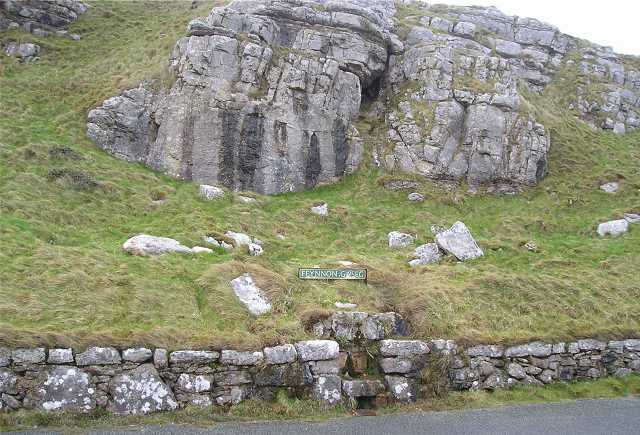
Just beyond the "Rest & Be Thankful" is Ffynnon Gaseg meaning "Mare's Well".
It is one of the scarce natural water sources on the limestone Great Orme.
The fountain was constructed by the road builders to provide water for the horses
(hence its name) that pulled the coaches laden with visitors in the days before motors.
Note the limestone rocks stained black by the peat laden water.
From just beyond this point it is down hill all the way to the west shore.
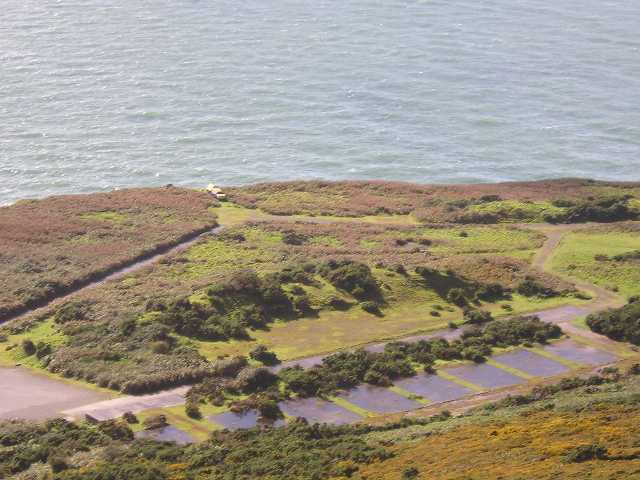
It is the only café on the Marine Drive and offers remarkably good quality and value.
There is a large car park for customers and there are fine views.
Just beyond the "Rest & Be Thankful" is Ffynnon Gaseg meaning "Mare's Well".
It is one of the scarce natural water sources on the limestone Great Orme.
The fountain was constructed by the road builders to provide water for the horses
(hence its name) that pulled the coaches laden with visitors in the days before motors.
Note the limestone rocks stained black by the peat laden water.
From just beyond this point it is down hill all the way to the west shore.
Way below the Marine Drive,
on the
south-western shelf near the west shore,
are the remains of the Royal Artillery Coastal Gunnery School
that moved from Shoeburyness to Llandudno in September 1940.
Over 700 military personnel were based at the school at its peak.
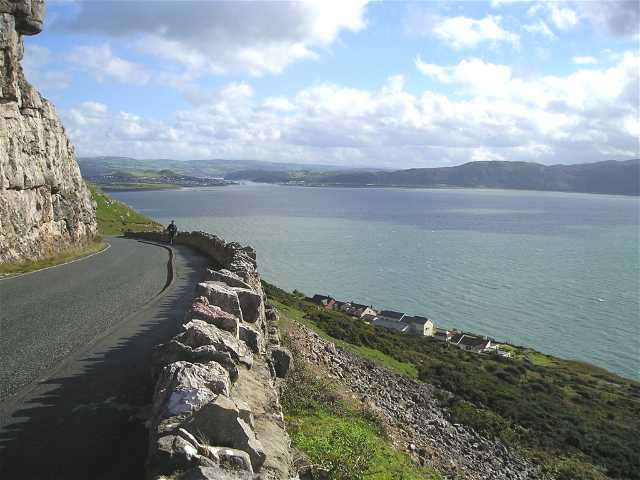
Below the marine drive on the coastal shelf between the gunnery school site
and the west shore is Llys Helig, a very exclusive housing development.
Beyond is the superb view of the River Conwy estuary.
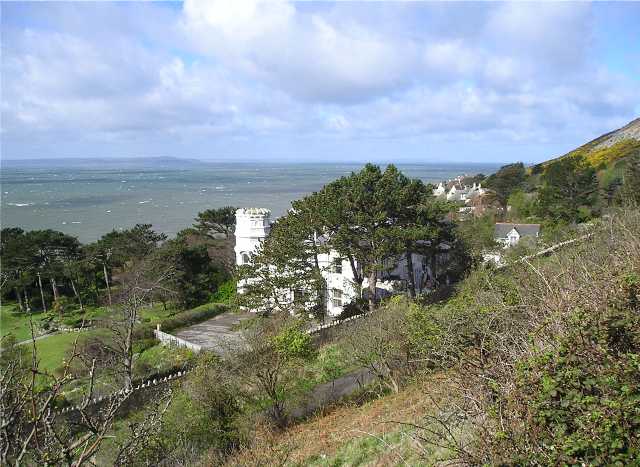
In the grounds of the recently extended, but now closed, Railway Convalescent Home
(until 1947 the Old Abbey Hotel) are the surviving remains below of Gogarth Abbey.
This was never a monastic house but a Palace of the Bishop of Bangor built on land
given to Bishop Anian by King Edward I in 1284 following the baptism by the bishop
of the first Prince of Wales. The Palace was burnt down by Owain Glyndwr c. 1405.
Although it remained the property of the Bishops of Bangor it was not rebuilt and
gradually many of the remains fell into the sea through coastal erosion.
The remains were sold by the church with its surrounding land in 1891.
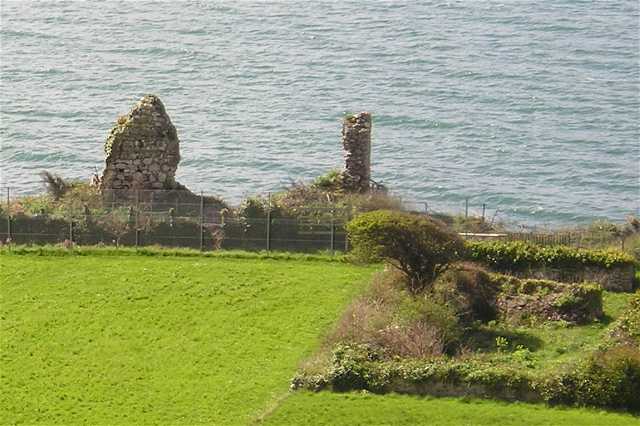
The above was photographed on April 17th 2004. The heavy storms of March 2005
brought more erosion in their wake and caused further collapse on to the beach below.
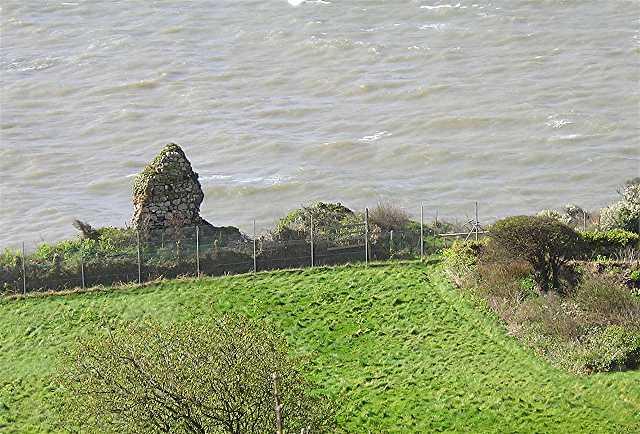
The western end of the marine drive is joined by Llys Helig drive near this point and
two way traffic occurs for the last half mile or so.
Click for a Map of the Great Orme showing the Marine drive.
are the remains of the Royal Artillery Coastal Gunnery School
that moved from Shoeburyness to Llandudno in September 1940.
Over 700 military personnel were based at the school at its peak.
Below the marine drive on the coastal shelf between the gunnery school site
and the west shore is Llys Helig, a very exclusive housing development.
Beyond is the superb view of the River Conwy estuary.
In the grounds of the recently extended, but now closed, Railway Convalescent Home
(until 1947 the Old Abbey Hotel) are the surviving remains below of Gogarth Abbey.
This was never a monastic house but a Palace of the Bishop of Bangor built on land
given to Bishop Anian by King Edward I in 1284 following the baptism by the bishop
of the first Prince of Wales. The Palace was burnt down by Owain Glyndwr c. 1405.
Although it remained the property of the Bishops of Bangor it was not rebuilt and
gradually many of the remains fell into the sea through coastal erosion.
The remains were sold by the church with its surrounding land in 1891.
The above was photographed on April 17th 2004. The heavy storms of March 2005
brought more erosion in their wake and caused further collapse on to the beach below.
The western end of the marine drive is joined by Llys Helig drive near this point and
two way traffic occurs for the last half mile or so.
Click for a Map of the Great Orme showing the Marine drive.